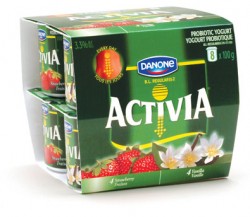Probiotics are live microorganisms thought to be healthy for the host organism. According to the currently adopted definition by FAO/WHO, probiotics are: "Live microorganisms which when administered in adequate amounts confer a health benefit on the host".
Lactic acid bacteria (LAB) and bifidobacteria are the most common types of microbes used as probiotics; but certain yeasts and bacilli may also be helpful. Probiotics are commonly consumed as part of fermented foods with specially added active live cultures; such as in yogurt, soy yogurt, or as dietary supplements.
Foods High in Probiotics
Yogurt is rich with probiotics and health experts recommend that it should be consumed 2-3 times a week. Milk, vitamin supplements and super-sugary food varieties also contains high amount of probiotics. Just check the label of these food products.
Probiotic-rich foods are often referred to as fermented or partially fermented foods. These foods often contain high probiotic counts thanks to the healthy bacteria and yeasts that develop during the fermentation process. Brine-cured pickles without vinegar and sauerkraut are fermented foods that contain probiotics. Sourdough bread made with true sourdough starter can be another source of probiotics
Benefits of Probiotic Foods

- Probiotics in Yogurt
Experiments into the benefits of probiotic therapies suggest a range of potentially beneficial medicinal uses for probiotics. For many of the potential benefits, research is limited and only preliminary results are available. It should be noted that the effects described are not general effects of probiotics. Recent research on the molecular biology and genomics of Lactobacillus has focused on the interaction with the immune system, anti-cancer potential, and potential as a biotherapeutic agent in cases of antibiotic-associated diarrhea, travellers diarrhea, pediatric diarrhoa, inflammatory bowel disease and irritable bowel syndrome.
In doing a quick search on Wikipedia gave me the following info on probiotic health claims
Managing lactose intolerance
As lactic acid bacteria actively convert lactose into lactic acid, ingestion of certain active strains may help lactose intolerant individuals tolerate more lactose than what they would have otherwise
As lactic acid bacteria actively convert lactose into lactic acid, ingestion of certain active strains may help lactose intolerant individuals tolerate more lactose than what they would have otherwise
http://www.fitnesstipsforlife.com/what-are-probiotics.html
No comments:
Post a Comment